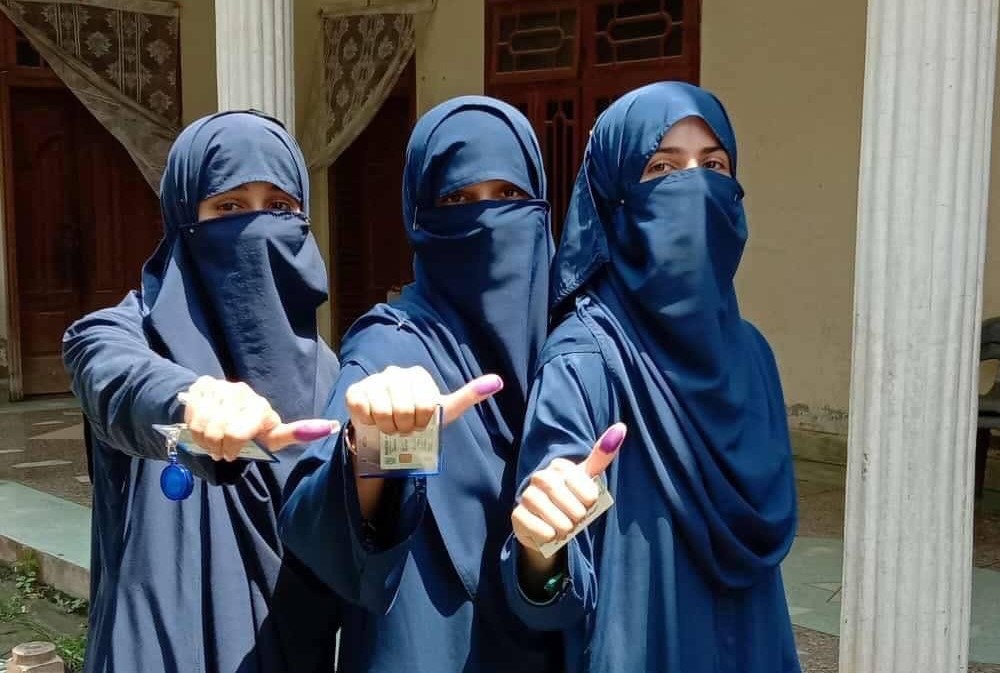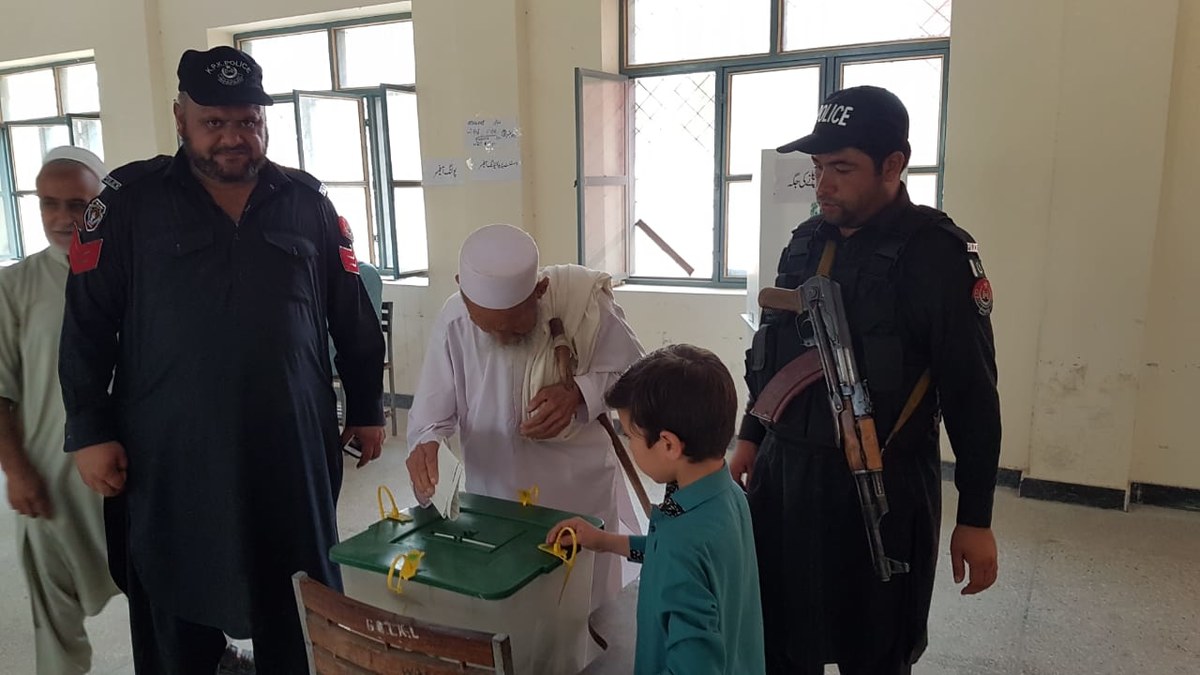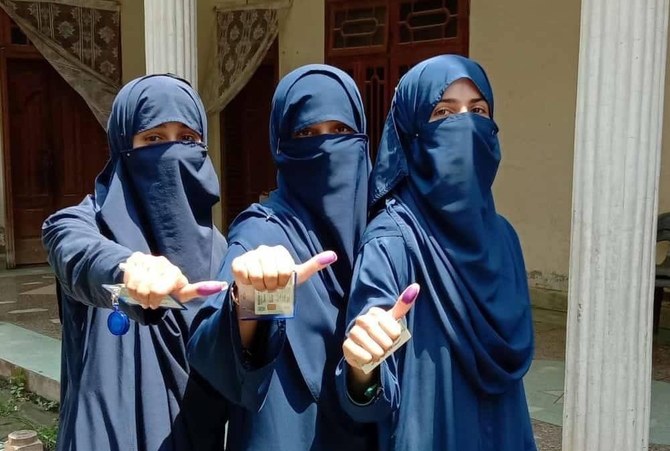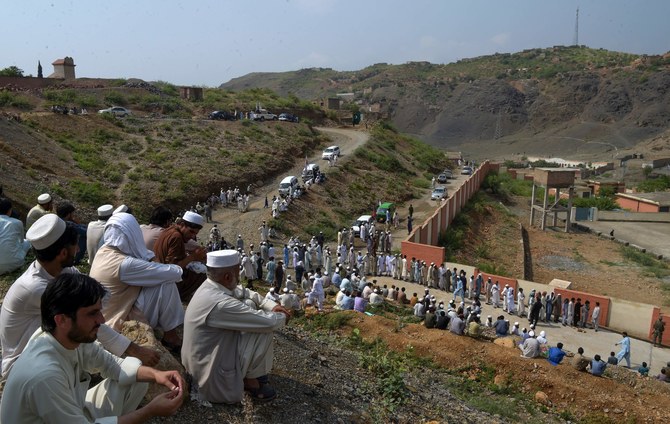PESHAWAR: A vote count continued late into the night on Saturday after polls closed at 5pm for the first-ever provincial assembly elections held in Pakistan’s seven previously lawless tribal areas bordering Afghanistan.
Last May, Pakistan’s parliament voted to merge these borderlands called the Federally Administered Tribal Areas into the northwestern Khyber Pakhtunkhwa province, granting the area’s five million majority ethnic Pashtuns the same constitutional rights as other Pakistanis. Previously, the area was ruled by draconian colonial era laws that denied people even basic rights.

Women pose for a group photo after casting their vote in the first-ever provincial assembly election in Khyber tribal district on Saturday July 20, 2019 (Courtesy PTI Khyber District)
Over the years, the lawlessness of the region has also seen it become a haven for militants, gun runners and drug smugglers, with residents complaining they are caught between the brutality of the militant groups that sheltered there and a state that has tried to combat them through military operations. Security remains precarious.
Though the result of Saturday’s election will have little direct impact on national politics, the exercise marks a significant milestone for an impoverished region that, without provincial status, had long suffered from a lack of national investment.
“It is really a historic moment and people are celebrating and jubilant in a manner as if it were Eid,” Sohail Khan, a spokesman for the provincial Election Commission of Pakistan (ECP), told Arab News. “The only problem is that people of remote villages find it difficult to access polling stations, which might have a negative impact on voter turnout.”

An elderly man casts his ballot between armed security officials in Khyber tribal district as voting for the first-ever provincial election took place in Pakistan’s former tribal areas on Saturday, July 20, 2019. (AN Photo)
Complaints of vote-rigging and influence peddling by some of the candidates and their supporters were also reported by media in the run-up to the elections, though the ECP denies this.
“It’s the first time we are electing our representatives for the provincial assembly but unfortunately most of the candidates are lavishly spending money on their political campaigns and buying votes,” one tribesman, Bilal Rahman Afridi, told Reuters in Jamrud subdivision of Khyber tribal district.
Despite these challenges, including the inaccessibility of polling stations for people from remote corners of the mountainous region, there were reports of a large voter turnout. Reports on social media said cellphone signals and Internet were jammed through the tribal areas for most of the day. Many people complained that they were assigned polling stations 50 miles away when there were booths right outside their homes.
A total of 2.8 million voters, including 1.67 million men and 1.13 million women, are registered to vote at 482 polling stations reserved for men, 376 for women voters, and another 1,038 that are open to both. There are 16 seats up for grabs, and 285 candidates are contesting, a majority as independents.
ECP’s Khan said voting had started at 8am and would continue until 5pm, with strict security arrangements in place. No security related issues or complaints had been reported so far, he added in an interview in the afternoon, but local media reports said firing between supporters of two political parties in Mohmand had left two injured.
According to the Election Commission, polling is underway at 1,897 stations throughout the erstwhile tribal areas, with 958 of them declared normal, 584 sensitive and 455 marked as most sensitive.
As per the ECP’s plan, soldiers have been deployed inside and outside polling stations for all 16 seats in the provincial elections from July 18 to July 21 to assist the ECP in conducting free, fair and transparent elections. The military has been requisitioned by the ECP under Articles 220 and 245 of the Constitution.
After polling ends, security forces will escort ballot papers back to the district treasuries and ECP strong rooms as per the plan issued by the commission. Troops will remain at the offices of returning officers until the consolidation of elections results.
Security forces were also deployed at all venues where presiding officers, senior assistant presiding officers and polling officers were trained from June 24 to July 7.
Ikramullah Dawar, an engineer and resident of North Waziristan, said “large groups of people” were leaving their villages in the district’s main town, Mir Ali, to cast their vote. People had woken up early in the morning, he said, and long lines could be seen outside polling stations.
“Voters, including even elderly men, are heading to polling stations in Wana... to poll their vote,” said Muhammad Noor, a tribal elder from South Waziristan, referring to the district’s summer headquarters.
Despite reports of a strong morning turnout, it is the more than one million women voters of the conservative region who will bear the full weight of tradition as they try to exercise their right to vote.
“I saw around two dozen women heading to polling stations in Hurmaz and Noor Janat Gul areas,” Dawar said, referring to two villages on the outskirts of Mir Ali. But cultural limitations and poor campaigns that failed to mobilize or facilitate women, he said, would keep many women away from polling booths.













